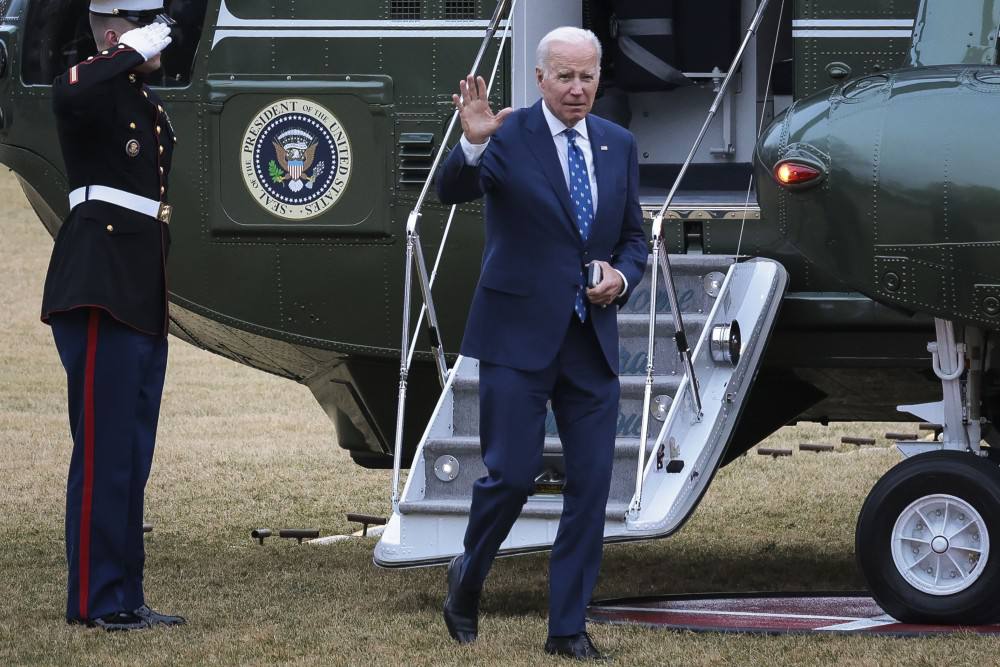Trump’s Shadow Over Biden and Ukraine
Washington’s Support Packages Under Trump’s Shadow
Trump’s shadow looms over Biden and Ukraine as the White House announces the latest military support package to Ukraine for 2023, but with the upcoming elections, U.S. support for Kyiv has become a topic of debate and contention.
Eternal support as long as the war continues sums up the U.S. stance on supporting Ukraine as it enters the third year of its war in two months. This Eastern European country, invaded by Russian forces on February 24, 2022, received the newly announced support package from the White House, possibly the last one without needing further congressional approval, where discussions on aid packages to Ukraine have reached a deadlock.
Thus, the Democratic administration of Joe Biden ends 2023 with another display of support for Kyiv, confirming that the United States remains the main Western backer of Ukraine, especially on a military level.
However, 2024 will be a year full of electoral events, including presidential elections in Russia and the United States. Observers believe this year will add the need to manage another crisis—the crisis in the Middle East—to the operational stalemate that has crystallized over several months. Some are now talking about an imminent strategic shift from Washington to close the game in Eastern Europe.
The Last Aid
The latest package approved by the Biden administration includes $250 million worth of weapons and military equipment for Kyiv. According to official State Department notes, the support package includes air defense ammunition, other anti-aircraft system components, additional ammunition for High Mobility Artillery Rocket Systems, 155mm and 105mm artillery ammunition, anti-armor weapons, and over 15 million rounds.
Finally, the statement or the note emphasizes that a coalition of 50 countries will continue to provide essential support to Ukrainian forces. At the bottom of the statement, it is stated that Congress must act swiftly to advance our national security interests by helping Ukraine defend itself and secure its future.
Political, military, and financial support for Kyiv has become part of a broad domestic political game in the United States. The agreement to send more weapons has been blocked by Republicans who want to link this action to tightening security regulations on the U.S.-Mexico border. Additionally, another $50 billion support package for Ukraine and a $14 billion aid package for Israel were rejected and not approved by the Senate in early December.
All Republicans lined up against this initiative, but in addition to Republicans, a group led by Bernie Sanders, who strongly criticizes the U.S. and Israel’s handling of the Middle East conflict, joined them.
The Potential Impact of Trump
The road to the 2024 U.S. presidential elections is still somewhat long and paved with obstacles, including judicial and legal issues, but despite all these distractions, a repeat of the Trump-Biden duel of 2020 doesn’t seem so far-fetched or impossible.
Next March, we will also witness presidential elections in Russia, an election whose outcome—the re-election of Vladimir Putin—is practically pre-written and confirmed. It seems that both Moscow and Kyiv are preparing for a longer confrontation, but should the New York businessman return to the White House, changes in Washington that could likely affect the course of the war are expected.
Chris Dolan, a political science professor at Lebanon Valley College, claims without doubt in the columns of The New York Times that with a second Trump administration, the United States will cut its support for Ukraine. On the other hand, Republican primary candidate Donald Trump announced that if re-elected, he would end the war within 24 hours. Trump also described Putin as very smart after the Moscow forces’ attack on Ukraine in February 2022.
Strategic Change
The current situation and next year’s presidential election results have greatly worried the White House. Politico writes that even if the Biden administration and its European partners continue their unlimited support for Kyiv, they still insist on the hypothesis of a strategic change to end this crisis.
The publication, citing two sources—an American government official and a European diplomat in Washington—indicates that European officials, considering possible negotiations to end the war, will shift the ultimate goal from Ukraine’s complete victory over Russia to improving Kyiv’s position. In other words, this is a strategic shift that requires strengthening the defensive positions of Ukraine rather than recapturing all territories occupied by the Russians.
The American official, who wished to remain anonymous, said this has always been our theory on the matter: the only way this war ends is through negotiation. He added, ‘We want Ukraine to have the best possible cards in case of negotiations.’ Facing a war that has lasted nearly two years amid an election campaign could make the situation much more complicated for Biden.
It seems that every day the chances of Donald Trump’s re-election and his return to the White House for next year are increasing, and polls show that he is clearly more popular than his rivals in the Republican primaries. The former president wins almost all the main states in a hypothetical matchup against Biden.
However, Biden suffers from a very high level of unpopularity, exacerbated by dissatisfaction with his domestic and foreign political activities and his administration’s poor performance, to the point where the initial bipartisan political and public consensus on Ukraine aid policy has gradually eroded. For the first time, deep rifts have appeared regarding Gaza between Democratic voters and a government that has been very cohesive and disciplined so far.

